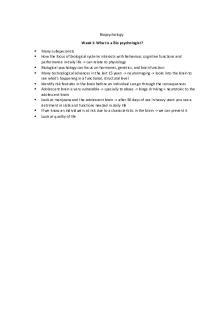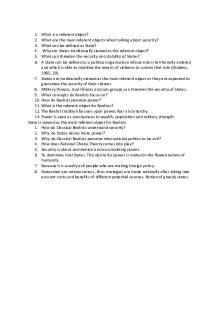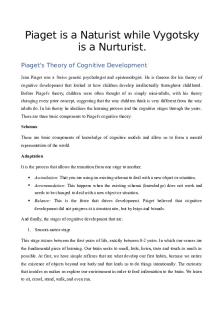Piaget is a Naturist while Vygotsky is a Nurturist PDF

| Title | Piaget is a Naturist while Vygotsky is a Nurturist |
|---|---|
| Author | Pancho Jimenez |
| Course | General Psychology |
| Institution | LaGuardia Community College |
| Pages | 4 |
| File Size | 101.1 KB |
| File Type | |
| Total Downloads | 92 |
| Total Views | 137 |
Summary
Download Piaget is a Naturist while Vygotsky is a Nurturist PDF
Description
Piaget is a Naturist while Vygotsky is a Nurturist. Piaget's Theory of Cognitive Development Jean Piaget was a Swiss genetic psychologist and epistemologist. He is famous for his theory of cognitive development that looked at how children develop intellectually throughout childhood. Before Piaget's theory, children were often thought of as simply mini-adults, with his theory changing every prior concept, suggesting that the way children think is very different from the way adults do. In his theory he idealizes the learning process and the cognitive stages through the years. There are three basic components to Piaget's cognitive theory: Schemes These are basic components of knowledge of cognitive models and allow us to form a mental representation of the world. Adaptation It is the process that allows the transition from one stage to another.
Assimilation: That you are using an existing schema to deal with a new object or situation.
Accommodation: This happens when the existing schema (knowledge) does not work and needs to be changed to deal with a new object or situation.
Balance: This is the force that drives development. Piaget believed that cognitive development did not progress at a constant rate, but by leaps and bounds.
And finally, the stages of cognitive development that are: 1. Sensori-motor stage This stage occurs between the first years of life, exactly between 0-2 years. In which our senses are the fundamental piece of learning. Our brain seeks to smell, look, listen, taste and touch as much as possible. At first, we have simple reflexes that are what develop our first habits, because we notice the existence of objects beyond our body and that leads us to do things intentionally. The curiosity that invades us makes us explore our environment in order to feed information to the brain. We learn to sit, crawl, stand, walk, and even run.
This increase in physical mobility consequently increases cognitive development. It is at this stage that we understand that an object continues to exist even when we don't see it. Piaget called it the "realization of the permanence of the object", which is a fundamental piece in the development of memory. We only understand and perceive our own point of view, as mentality and perception remain only self-centered, we are very egocentric. 2. Pre-operational stage This stage takes place between the ages of 2 to 7. Our thinking development is largely classified by intuitive thinking and symbolic functions. There is the belief of life in objects, being a stage with many fantasies. Since we cannot perform specific cognitive operations, that is why Piaget calls it preoperative. We learn that words, images and gestures mean something more, this same symbolism is the basis of learning. We take new roles and play pretend, allowing us to have new experiences and learn new things. Around the age of 4, we became very curious beings, wanting to know everything, so we ask questions very frequently. We can call this the birth of cognitive reasoning. Piaget calls it the "intuitive age" because we realize that we have a lot of knowledge, despite not knowing how we acquired it. Thinking is still egocentric. 3. Concrete operational stage This stage is carried out between the ages of 7-11 years. We discover logical and concrete cognitive processes; this inductive thinking allows us to reach conclusions based on our previous knowledge. Our brain learns to rearrange our thoughts and classify them into operational mental structures. Perception and empathy increases, so there is already an understanding that our feelings and thoughts are unique and are not necessarily shared by others. 4. Formal operational stage This stage goes from 12 years old and up. Our advanced cognitive skills allow us to understand abstract concepts. We have a much deeper understanding of identity and morality. We believe to understand people's behavior, given the empathy and compassion we developed. Our brains can now perform deductive reasoning, from statements into logical conclusions. We become systematic and routines are based on our priorities. We can already think about thinking, philosophize about the nature of our existence.
Vygotsky's Theory of Cognitive Development Lev Vygotsky was a Russian psychologist, one of the foremost theorists in developmental psychology, founder of cultural-historical psychology, and forerunner of the nurture of thinking. Vygotsky's theory of social development argues that community and language play a central role in learning. While Jean Piaget concluded that children's cognitive development occurs in stages, Vygotsky rejected his ideas and believed that children develop independently of specific stages as a result of social interactions. Vygotsky declared that we are born with four "elemental mental functions": attention, sensation, perception and memory. It is our social and cultural environment that allows us to use these elemental skills to develop ourselves and ultimately obtain 'superior mental functions'. This development occurs ideally in "The Proximal Development Zone". First, there is what we can do on our own, the next area represents what we can do with the help of what Vygotsky calls the "more knowledgeable other" and, finally, there is what is beyond our reach. Learning and developing higher cognitive functions are achievable for those who learn with the help of a capable mentor who can reach the full potential of their ability. Vygotsky, therefore, believed that within the Proximal Development Zone, learning can precede development. This means that a child can learn skills that go beyond his natural maturity. He also established an explicit connection between speech and mental concepts, arguing that inner speech develops from outer speech through a gradual process of "internalization." This means that the thought itself develops as a result of the conversation.
Discussion We can conclude then that Piaget is a naturalist, his theory of the development of thought is based on human nature and justifies the behavior of individuals through stages that occur due to their maturity and age. Regardless of knowledge, it is the perception of its stage that provides it with more or less understanding, being that the more adult it is, the better understanding and reason it is acquired. On the other hand, Vygotsky infers that human beings are born with the same learning capacities, being our environment and mentors who shape and favor our learning process, regardless of their age. The better the teaching and knowledge of mentors, the better development an individual will show, compared to their less fortunate peers. Therefore, it is the construction and nurture of thought that cause the cognitive thinking of an individual to be enhanced or deteriorated. They are two very different currents of thought and at various points, very counterproductive, that seek to explain in some way the development of cognitive thinking, its primary causes and how to incentivize it to reach optimal development.
Bibliography:
https://www.verywellmind.com/jean-piaget-biography-1896-1980-2795549 https://www.simplypsychology.org/piaget.html https://en.wikipedia.org/wiki/Lev_Vygotsky https://www.simplypsychology.org/vygotsky.html...
Similar Free PDFs

Piaget VS. Vygotsky - Grade: A
- 7 Pages

Piaget, Ausubel y Vygotsky
- 12 Pages

Piaget Versus Vygotsky
- 3 Pages

Piaget and Vygotsky Moodle
- 4 Pages

Is Malaysia is a Secular state
- 3 Pages

STA TISTIK A B IS N IS
- 182 Pages

Who is a Tamil
- 19 Pages

What is a Biopsychologist
- 1 Pages

A Murder on a Sunday Morning is
- 2 Pages

Is the Gaydar a myth
- 8 Pages

What is a referent object
- 1 Pages

One death is a tragedy
- 2 Pages
Popular Institutions
- Tinajero National High School - Annex
- Politeknik Caltex Riau
- Yokohama City University
- SGT University
- University of Al-Qadisiyah
- Divine Word College of Vigan
- Techniek College Rotterdam
- Universidade de Santiago
- Universiti Teknologi MARA Cawangan Johor Kampus Pasir Gudang
- Poltekkes Kemenkes Yogyakarta
- Baguio City National High School
- Colegio san marcos
- preparatoria uno
- Centro de Bachillerato Tecnológico Industrial y de Servicios No. 107
- Dalian Maritime University
- Quang Trung Secondary School
- Colegio Tecnológico en Informática
- Corporación Regional de Educación Superior
- Grupo CEDVA
- Dar Al Uloom University
- Centro de Estudios Preuniversitarios de la Universidad Nacional de Ingeniería
- 上智大学
- Aakash International School, Nuna Majara
- San Felipe Neri Catholic School
- Kang Chiao International School - New Taipei City
- Misamis Occidental National High School
- Institución Educativa Escuela Normal Juan Ladrilleros
- Kolehiyo ng Pantukan
- Batanes State College
- Instituto Continental
- Sekolah Menengah Kejuruan Kesehatan Kaltara (Tarakan)
- Colegio de La Inmaculada Concepcion - Cebu



